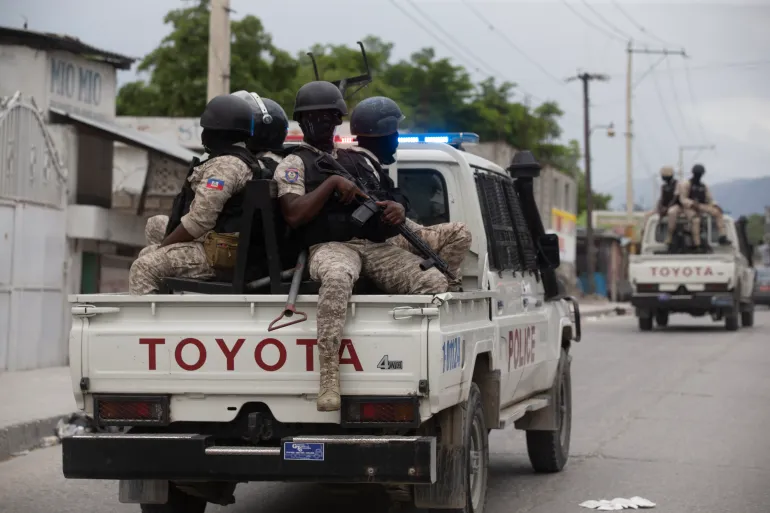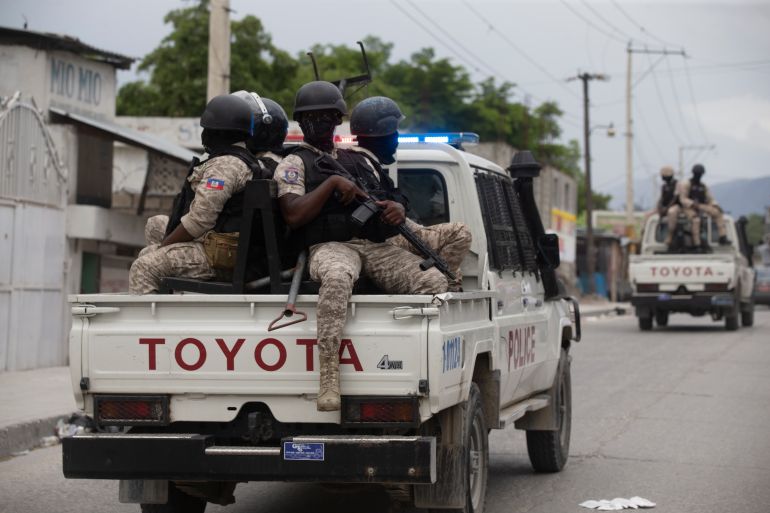Canada to send warships to Haiti amid ongoing violence

Violence from powerful criminal organisations has racked the island since the assassination of President Jovenel Moise.

Canada will send navy vessels to the coast of Haiti to gather intelligence as the Caribbean nation continues to reel from economic and political insecurity as well as violence, much of it driven by organised criminal groups.
Canadian Prime Minister Justin Trudeau announced the decision at a meeting of Caribbean leaders in the Bahamas on Thursday. Among the topics they discussed were the powerful armed gangs operating in the country, leading to widespread reports of murder, kidnappings and sexual violence.
“Right now, Haiti is confronted with unrelenting gang violence, political turmoil and corruption,” Trudeau said. “Now is the moment to come together to confront the severity of this situation.”
The Canadian leader did not specify how many ships would take part in the effort or the duration of their mission. The announcement came during a meeting for CARICOM, the 15-member Caribbean trade bloc.
Haitian leaders including Prime Minister Ariel Henry have previously requested military assistance from the international community to help curb the escalating violence.
But some Haitians have pushed back against those calls, citing Haiti’s long and troubled history with foreign intervention.
Last Friday, United Nations human rights chief Volker Turk also called for an international force to help end the island’s “living nightmare”.
Haiti’s gangs have seen their power grow since the assassination of former Haitian President Jovenel Moise in July 2021. The UN estimated in December that 60 percent of the capital city of Port-au-Prince was under gang control.
For more than a month, starting last September, a powerful gang alliance known as the G9 Family and Allies also blockaded a key fuel terminal in the capital, effectively shutting down commerce for much of the city and sparking a humanitarian crisis.
With rubbish piling up and clean water growing scarce during the blockade, Haiti documented its first case of cholera in nearly three years. Since then, infections have shot up.
For many Haitians, the conditions amid the violence have become unbearable, with many seeking refuge abroad.
In January, the United States unveiled new rules that would allow up to 30,000 people a month to arrive from Nicaragua, Haiti, Venezuela and Cuba so long as they meet a strict set of requirements, including extensive vetting. But under the new programme, Haitians who try to cross into the US from Mexico would be turned away.
The UN has urged countries not to deport refugees and migrants back to Haiti, citing the dangerous conditions there.
Speaking at CARICOM on Thursday, Trudeau explained that Haiti’s plight “weighs heavily” on him. He also pledged $9.1m in humanitarian assistance, as well as $7.4m to help protect Haitian women and children along the country’s border with the Dominican Republic.
Tens of thousands of Haitians and people of Haitian descent have been deported from the Dominican Republic over the past year, despite international criticism against the removals.
Both Canada and the US have previously sent military hardware to the Haitian government and imposed sanctions on individuals accused of corruption or criminal ties in Haiti.
That tactic continued on Thursday, as US Secretary of State Antony Blinken announced further sanctions against “five individuals and seven family members” with links to criminal groups that “have threatened the livelihoods of the Haitian people and are blocking life-saving humanitarian support”.
Haiti’s Prime Minister Henry even suggested the US and Canada could lead the proposed foreign intervention. But neither country has offered to head such a force.







